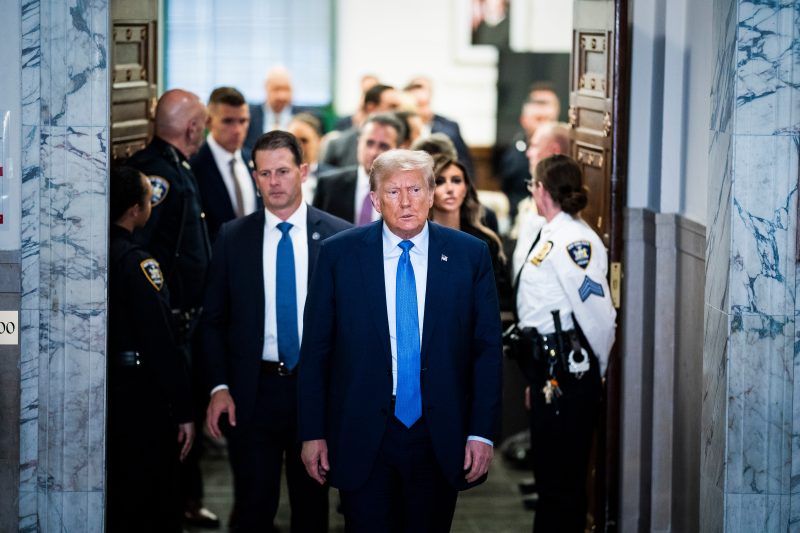
Grievances, insults, tangents: Trump brings his 2024 campaign into the courtroom
NEW YORK — Donald Trump portrayed himself as the victim of “election interference” and a “political witch hunt.” He talked about crime in the streets of New York. And he decried the “weaponization” of a judicial system that he alleges, without evidence, is unfairly targeting him.
But the former president wasn’t speaking at a campaign rally in Iowa or New Hampshire — his typical venue for airing grievances, baseless claims and other invective. Instead, he appeared Monday inside a courtroom here in the city where he has spent most of his adult life. New York Attorney General Letitia James was alleging that he and his company falsely inflated property values to gain lending advantages, and Trump was on the witness stand.
As he testified for several hours at 60 Centre St., Trump insulted James, calling her a “political hack.” He frequently sparred with the judge in the case, New York Supreme Court Justice Arthur Engoron, at one point saying, “He called me a fraud, and he didn’t know anything about me.”
Trump at times looked annoyed or bored, holding his hands in his lap as he faced questions from Kevin Wallace of the attorney general’s office about the Trump Organization’s past financial statements. Trump shook his head and sat back in his chair as his lawyers argued with Engoron. He called the process a “crazy trial.”
He flipped through documents from the state. Partway through the day, he took out a piece of paper, claiming it would exculpate him, and asked the judge if he could read it.
When the judge declined, Trump muttered sarcastically: “I’m shocked.”
Monday’s testimony offered a glimpse of the extraordinary intersection of a presidential candidate’s political strategy and conduct in court. Facing 91 criminal charges across four indictments, Trump is expected to have to spend much of his next year dealing with cases, potentially finding himself in and out of courtrooms as he seeks a return to the presidency.
Now the clear polling leader in the Republican primary, Trump has leveraged his legal entanglements as a way to portray himself as a victim of an effort through the courts to stop him politically. He declared the trial “very unfair” on Monday and said: “I hope the public is watching.”
The New York civil case may be the only time he appears on the witness stand. Trump, whose real estate ventures helped propel him to the White House, appeared to take the case especially personally, as he repeatedly decried the attorney general and judge’s valuations of Mar-a-Lago, his prized resort property.
Even as Monday marked his first time delivering lengthy testimony, Trump has taken a break from the campaign trail to sit in on the case several times.
“The fraud is on the court, not on me,” Trump said as he reflected on the case, growing increasingly frustrated. “Either people are very stupid or there’s a fraud. The fraud is on behalf of the court.”
Beyond the insults and personal attacks, Trump revived other tactics he has used on the campaign trail.
There were tangents and exaggerations.
“I became president because of my brand. I sell books at levels that are incredible because of my brand,” he said at one point.
In response, the judge referred to the prosecutor and asked, “Mr. Wallace, did you ask for an essay on brand value?”
Trump claimed he was “more expert than anybody else” during one exchange, adding: “I’ve shown I know more about real estate than other people.”
There were references to public opinion surveys.
Standing outside the courtroom, Trump cited a recent New York Times/Siena College poll that showed him ahead of President Biden in five battleground states. “People are sick and tired of what’s happening, I think it’s a very sad day for America,” he said.
One of his lawyers, Chris Kise, at one point referred to Trump as the “former and again soon-to-be commander in chief.”
And when Trump criticized the merits of the case, Engoron, not hiding his exasperation with the former president’s meandering answers, addressed Trump’s lawyers: “Can you control your client? This is not a political rally.”
When asked about a 2021 financial statement, Trump replied that he was “so busy” in the White House. “My threshold was China, Russia and keeping our country safe,” he said.
Except that Trump had already left the White House by late January of that year, which Wallace quickly noted.
“You weren’t president in 2021, correct?” he asked.
Trump responded: “No, I wasn’t.”
There was bombast, as Trump repeatedly claimed his assets were undervalued. There were boasts, as he called one his properties “maybe the greatest golf course ever built.” There were claims of being underestimated: “Everybody said I could never get it zoned.”
Underlining all of it is a real threat to Trump’s ability to do business in New York. James is suing Trump and others for $250 million, and the judge has determined that Trump and his company committed fraud by overvaluing his assets. Because the case is a civil trial and not a criminal trial, no one will go to prison.
Trump has been fined $15,000 for violating a gag order, after he attacked the judge’s law clerk. His sons Donald Trump Jr. and Eric Trump testified last week, and his daughter Ivanka Trump is scheduled to appear this week.
Earlier in the day, the Trump campaign was fundraising off his appearance in court, claiming “this is how dictatorships are born” and posting on his social media website throughout the day.
As he was leaving the courthouse, Trump stuck a final note of defiance.
“It’s a case that should be immediately dismissed,” he said.
